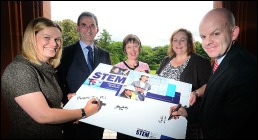
04/06/2014
Twenty leading employers in the STEM (Science, Technology, Engineering and Mathematics) sector in Northern Ireland have signed up to a new equality charter to demonstrate their commitment to improving gender balance in their business.
The Charter (pdf), which is a first for Northern Ireland was launched on 4 June at an event organised by the Department for Employment and Learning STEM Business Group and the Equality Commission for Northern Ireland.
Evelyn Collins CBE, Chief Executive of the Equality Commission, said: “The Equality Commission is delighted to be working with DEL and the STEM business group in the development of the STEM Charter and I congratulate the employers who are the first to place on record their commitment to taking the necessary steps to recruit and retain more women in their workplace.
“The current under-representation of women in scientific and technical jobs is not simply a gender equality issue; it is a broader economic issue that has huge consequences for our future prosperity and growth.
“It is vital that bright young women with an aptitude for STEM subjects are inspired to see careers in the sector as an attractive option,” Ms Collins said. “This means being ambitious and determined in how we encourage girls and women to pursue the STEM subjects, and more importantly, in how we translate this into further and higher education and, ultimately, into the workplace.”
Northern Ireland businesses are already reporting difficulties in recruiting and retaining enough staff with the required level of experience and skills; and in high level STEM posts men outnumber women by more than three to one.
“One possible solution is to target those girls and women who are not presently considering STEM careers,” Evelyn Collins said.
Speaking at the launch Derek Baker, Permanent Secretary of the Department for Employment and Learning said: “Addressing gender bias in STEM was identified as an issue in the STEM Strategy, ‘Success through STEM’. My Department has played a leading role in the production and implementation of the Strategy.
“I commend the leadership example demonstrated by the participating STEM businesses today. By working in partnership to develop the STEM CEO Charter and in signing the Charter today, you, our business leaders, will be giving a strong public message to demonstrate your commitment to supporting gender diversity and equality, to increase the participation and progression of women in STEM.”
Gordon Parkes from NIE, one of the initial signatories to the STEM Charter, told delegates that they must “take opportunities to tackle unconscious bias” in their promotion of careers to girls and women. He said “the under-representation of women in areas such as engineering and technology isn’t just an individual company problem but a cultural one. Parents and other influencers needed to recognise STEM careers as an attractive option.”
Lisa O’Neill, a graduate engineer with NIE, outlined some of the simple measures employers and training providers need to take to attract more girls and women to STEM careers. She said there is still an image problem and a common perception that engineering is not a suitable career for females. Companies must promote their female employees as role models for young girls to ensure that they realise that working in a STEM job is something they can do.
Lisa Gepp from Schrader Electronics Ltd said: "Schrader Electronics are delighted to be signing the STEM CEO Charter as we recognise the need to engage, attract, recruit and develop individuals in STEM-related disciplines and to further promote the role of females within STEM disciplines. The STEM Charter will create opportunities for businesses as well as demonstrating their commitment to supporting gender diversity and equality."
The Equality Commission can offer practical support and guidance to any STEM employer who wants to get involved. It will be establishing a STEM employer network to promote and share good practice and help employers understand the lawful positive action they can take to address gender imbalance in STEM.
Interested employers should contact Frank Fleming in the Commission’s Advice and Compliance team – Tel: 028 90 500 600.
Ends
Notes for editors:
- Further information on the STEM strategy is available on the Equality Commission's STEM web page
- “Addressing gender balance – reaping the gender dividend in STEM” - Report by STEM business group
- Under sex discrimination law, employers and training providers are allowed to take positive action to encourage under-represented groups to take up training or employment opportunities. The Equality Commission can advise employers and training providers on appropriate and lawful positive action.
- Employers who have signed up to the STEM Charter are: Moy Park, Bombardier, NIE, Schrader Electronics, Liberty NI, Magellan Aerospace, Atkins Global, PathXL, Michelin Tyre plc, Northern Regional College, Asidua, Ulster Bank, University of Ulster, Seagate, Queen's University, the Open University, Sci-Geist, McAvoy Corry Ltd, Sentinus and Intel.
- Others who have committed to signing including Schlumberger, Allstate, JTI, SEMTA, Specialisterne NI and Diamond Recruitment.
Photo caption: (L-R) Ruth Cunningham, Michelin; Derek Baker, Permanent Secretary Department for Employment and Learning; Evelyn Collins, Chief Executive Equality Commission; Dr Joanne Stuart, STEM Business Group; Greg Quinn, Moy Park.